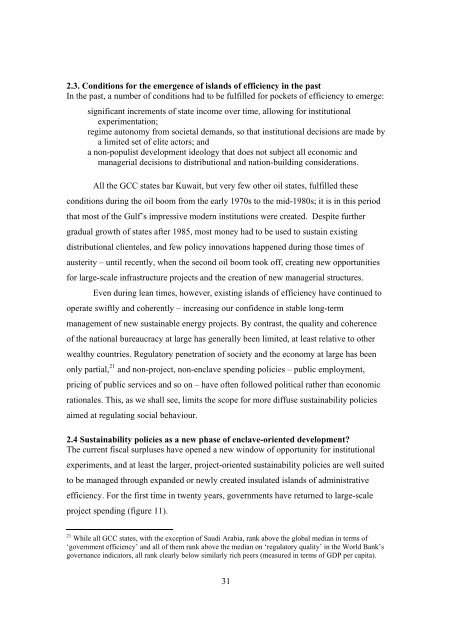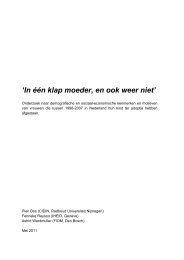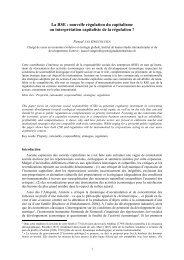PDF - Graduate Institute of International and Development Studies
PDF - Graduate Institute of International and Development Studies
PDF - Graduate Institute of International and Development Studies
You also want an ePaper? Increase the reach of your titles
YUMPU automatically turns print PDFs into web optimized ePapers that Google loves.
2.3. Conditions for the emergence <strong>of</strong> isl<strong>and</strong>s <strong>of</strong> efficiency in the past<br />
In the past, a number <strong>of</strong> conditions had to be fulfilled for pockets <strong>of</strong> efficiency to emerge:<br />
significant increments <strong>of</strong> state income over time, allowing for institutional<br />
experimentation;<br />
regime autonomy from societal dem<strong>and</strong>s, so that institutional decisions are made by<br />
a limited set <strong>of</strong> elite actors; <strong>and</strong><br />
a non-populist development ideology that does not subject all economic <strong>and</strong><br />
managerial decisions to distributional <strong>and</strong> nation-building considerations.<br />
All the GCC states bar Kuwait, but very few other oil states, fulfilled these<br />
conditions during the oil boom from the early 1970s to the mid-1980s; it is in this period<br />
that most <strong>of</strong> the Gulf’s impressive modern institutions were created. Despite further<br />
gradual growth <strong>of</strong> states after 1985, most money had to be used to sustain existing<br />
distributional clienteles, <strong>and</strong> few policy innovations happened during those times <strong>of</strong><br />
austerity – until recently, when the second oil boom took <strong>of</strong>f, creating new opportunities<br />
for large-scale infrastructure projects <strong>and</strong> the creation <strong>of</strong> new managerial structures.<br />
Even during lean times, however, existing isl<strong>and</strong>s <strong>of</strong> efficiency have continued to<br />
operate swiftly <strong>and</strong> coherently – increasing our confidence in stable long-term<br />
management <strong>of</strong> new sustainable energy projects. By contrast, the quality <strong>and</strong> coherence<br />
<strong>of</strong> the national bureaucracy at large has generally been limited, at least relative to other<br />
wealthy countries. Regulatory penetration <strong>of</strong> society <strong>and</strong> the economy at large has been<br />
only partial, 21 <strong>and</strong> non-project, non-enclave spending policies – public employment,<br />
pricing <strong>of</strong> public services <strong>and</strong> so on – have <strong>of</strong>ten followed political rather than economic<br />
rationales. This, as we shall see, limits the scope for more diffuse sustainability policies<br />
aimed at regulating social behaviour.<br />
2.4 Sustainability policies as a new phase <strong>of</strong> enclave-oriented development?<br />
The current fiscal surpluses have opened a new window <strong>of</strong> opportunity for institutional<br />
experiments, <strong>and</strong> at least the larger, project-oriented sustainability policies are well suited<br />
to be managed through exp<strong>and</strong>ed or newly created insulated isl<strong>and</strong>s <strong>of</strong> administrative<br />
efficiency. For the first time in twenty years, governments have returned to large-scale<br />
project spending (figure 11).<br />
21 While all GCC states, with the exception <strong>of</strong> Saudi Arabia, rank above the global median in terms <strong>of</strong><br />
‘government efficiency’ <strong>and</strong> all <strong>of</strong> them rank above the median on ‘regulatory quality’ in the World Bank’s<br />
governance indicators, all rank clearly below similarly rich peers (measured in terms <strong>of</strong> GDP per capita).<br />
31




